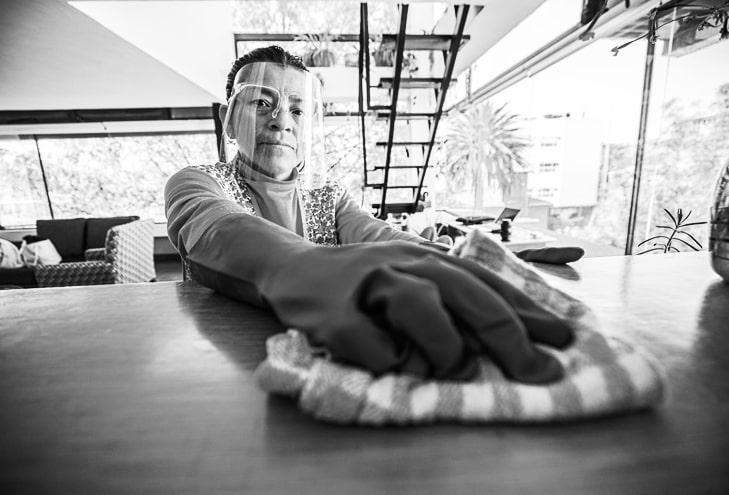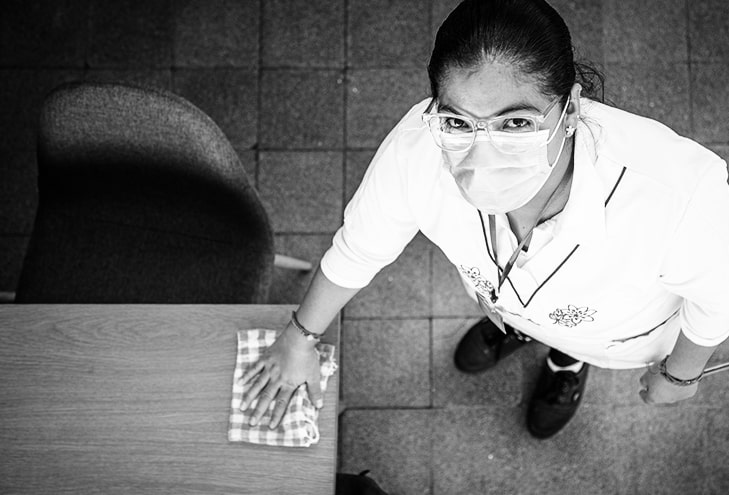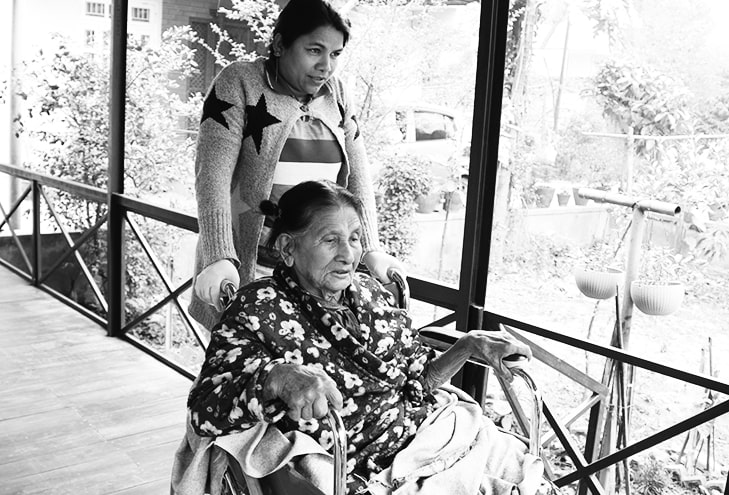From the perspectives of domestic workers, key reasons behind their disenfranchisement within the inequitable conditions in domestic work include material poverty, lack of social support including loss of family members, intra-household conflicts, early marriage, and divorce.
Yarmot
My name is Yarmot Enemayehu. I am 27 years old. I was born in Bibugn’s rural district, 80km away from Debre Markos Zonal Town.
I was forced into an engagement then an early marriage when I was 11 years old by my family. Since my husband and I were children, we were living separately. Despite still being at the family’s house, my family decided to stop my education after I got married. Rejecting my family’s attempt, I went to my sister’s home. She lived in Debre Markos town.
Living with my sister’s children was not easy. Most of the time, they would disturb me and make me feel uncomfortable and unwelcomed. It was difficult to live and work in the same household as my sister, which is why I started working as a domestic worker in other households. I served in two different houses as a fulltime worker for three years, which made ends meet. It was around that time that I met my boyfriend. I got pregnant and lost my job and had to find a place to live. My boyfriend was a daily laborer and was taking care of me by contributing to rent and food. However, his support stopped after some time. I had to resume work as a part time domestic worker, and I picked up tasks such as washing clothes, cleaning private houses, and baking “Injera”, the local bread. My daughter was born, and I continued to work in this way.
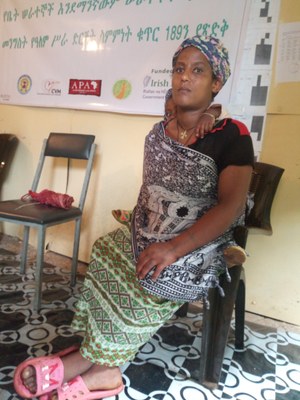
I know about COVID-19 prevention and symptoms. However, it is still difficult to survive the crisis while living my life. Many employers are now under lockdown in their homes and are no longer allowing domestic workers into their households. Before this pandemic, I worked in more than one household, and was able to receive some form of payment. But I now work in one house only, and so it is making it difficult to cover the expenses and survive the crisis.
In these challenging times, no one is assisting me except for domestic worker organizations. The organization supports me with sanitary equipment and food items. I am grateful for the support provided by CVM and IDWF.
Hiwot
My Name is Hiwot Abiyou, I am single and 23 years old. I was born in 1997 in Amhara Region East Gojjam zone Awabel worda. I pursued my education until the 6th grade, but my family’s socio-economic conditions stood in the way of completing it. I decided to move to an urban area, to ease my access to income and to continue my education there. I migrated to Debre Markos town where I got employed as a domestic worker for 6 years in two houses. I did not receive a salary, but the employer and CVM covered my educational material, clothes, and other expenses. I am also a member of Mulutesfa Domestic Workers union.
Now I am a part-time domestic worker. I live alone. I already reached grade 10+1 in Debre Markos poly technic College where I study, but my education was paused due to COVID-19. I know the COVID-19 prevention methods and symptoms. I have educated myself about it through television, radio shows, CVM awareness leaflets and expert advice. COVID-19 made me dropout of college and left me jobless. I encounter the daily difficultly of paying rent and carrying on with my life.
Unions like Mulutesfa, CVM and IDWF understand the situation of domestic workers disproportionate exposure to COVID-19. They support us with sanitary materials such as soap, sanitizer, and food items like 10kg wheat flour, 3kg rice, and 1-liter oil. These items ensure my subsistence and help me prevent infection by practicing frequent hand washing, avoiding physical contact, and using sanitizer. They minimize the number of emergencies I must deal with. Domestic workers, like myself, still need material support towards rent, as COVID-19 left us jobless. We need to secure the roofs over our heads, and we hope for continuous support.
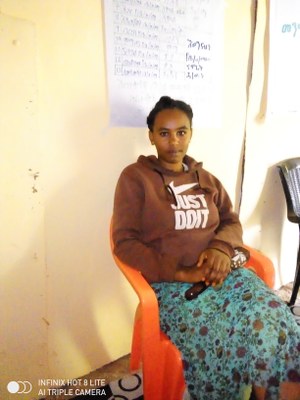
Tena Zena
My name is Tena Zena, I am the president of Mulutesfa domestic workers union.
I am single and 26 years old. I live in Amhara Region East Gojjam zone a town called Debre Markos. I have two siblings: one sister and one brother. I was also orphaned as an infant; I lost my father when I was one year old.
My family, originally coming from a working-class background, got into more challenging conditions. My mom was a street vendor, selling vegetables near the road and the market place. She continues with this activity despite its difficulty. To help my family, I started working as a domestic worker at the age of 11, and I was employed with my aunt. I lived with her, with no compensation: she did not pay me a salary, but she covered the costs of my education from buying me schoolbooks, medication, and clothes.
After completing my 10th grade, I went to the Debremarkos Technical and Vocational Education College, where I studied Information Communication Technology (ICT). I acquired a level 4 ICT certificate. After graduating with a junior college diploma, I was able to get job by contract government employee in the position of secretary and office administration. But I got sick in the middle of my career.
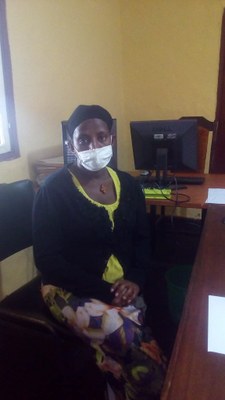
Seeing my pain, my mother took me to the monastery to baptize me in holy water. After recovering from the sickness, I came to my office to work, but my employer was not willing to take me back since I have missed some working days. With a dire need for a job and no options available, I decided to travel to find work to Arab countries.
Life in Kuwait was not kind to me. I faced regular starvation as the employers did not give me enough food. I was only allowed to eat once a day at nighttime. It was heartbreaking for me, and I had to eat raw tomatoes to fill up my stomach. The employer also forced me to do additional work for their relatives and neighbors: more households to care for.
After a one-year stay in Kuwait, I suddenly fell when cleaning the household and badly hurt my backbone. I went to the hospital where I paid for my own payment. But I could not recover from the pain. I wanted to continue the treatment, but I could not afford the expenses. So I was forced to return to Ethiopia. There, I had no money, as my employers did not give 6 months’ worth of salary. I faced multiple problems. My sickness aggravated and I was all alone. Nobody supported me for medical treatment as well as for my daily needs. I was angry and sick; my pain was not only physical but also psychological. I lost all hope. Instead of giving up and thinking that “I prefer dying rather than living this life,” I asked for support from the city administration office. I found not support there, but they introduced me to the Mulutesfa Workers’ Union.
Fortunately, Mulutesfa Workers’ Union and Comunita Volontari per il Mondo (CVM) gave vocational training for 10 selected women among their members and provided us with ETH birr 45,000.00 as startup capital. So, I started working on the matter. After a while, I got a temporary job, in my profession as a data encoder in Debre Markos town with monthly salary ETH birr 2,500.00. In addition to that, I have laundry-machine at home, so I wash clothes during in my spare time. Now, I am finally doing well.
CVM/APA has assisted us in many things: organized us, introduced us to the government and the people; educated and trained our members. It trained us for income generating activities. CVM/APA has shown us the way to our rights, contractual agreements, professional competence, etc. We are glad it’s connected to the IDWF, and that we’re working together. IDWF is doing precious things for our union, some of our members have engaged in continental trainings and exchanges of experience; IDWF and CVM/APA help when we’re in difficulty, we are happy that their purpose is to help us.
I never want to go to any Arab country again. I advise domestic workers and other women to work here instead. Now, I am a president of Mulutesfa domestic workers Union since 2018 and I’m pursuing my first degree in management.
I am coordinating the prevention responses of COVID-19 and working on methods of mobilization through radio and media. I am also applying the knowledge within my union to protect myself and the members from getting infected. We have benefited from IDWF supports of sanitary material soap, sanitizer and food items such as rice , oil, wheat flour, face masks, and radio-tape material. We have established a COVID-19 group to raise awareness.
Thank you so much for giving me the opportunity.
Tena Zena, President of Mulutesfa Domestic Workers’ Union.

